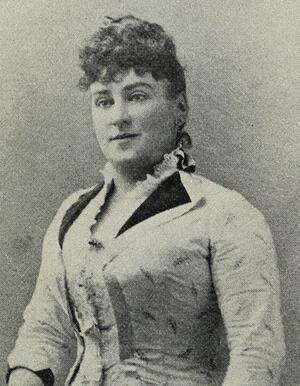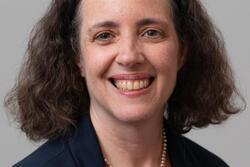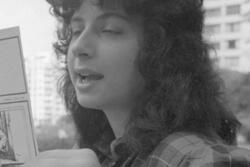Julie Rosewald: America's first woman cantor
She wrote a book. She was an actress. She sang opera. She became a professor. She toured the world by herself. She paid her own way. She was a musical superstar. She rode a bike around San Francisco. Any of these things might be common today (well maybe not riding a bicycle around hilly San Francisco), but in 19th-century America, it was unusual for a woman to do even one of these things, not to mention all of them, and unheard of for a woman to become a Jewish cantor.
Julie Eichberg Rosewald (1847-1906), affectionately called “Cantor Soprano” by her congregation, became America’s first woman cantor, serving San Francisco’s Temple Emanu-El during the years 1884-1893. She sang the solo parts in all the services, chose and directed the music at the synagogue, directed choir rehearsals, and collaborated with the organist. She performed all the musical functions of a cantor at a time when Jewish worship, like most liturgical functions in western religions, was led by men. However, there always seem to be exceptions to rules, and Julie Rosewald is one of them.
As I describe in my recent article in the American Jewish Archives Journal, “’Cantor Soprano’ Julie Rosewald: The Musical Career of a Jewish American ‘New Woman,’” by any standard, this woman had a remarkable career.
I discovered her when I was searching for Jewish women musicians for my website, The Jewish Music WebCenter. One day, I typed the word “soprano” into the newly digitized 1906 Jewish Encycopedia. Several entries came up but it was the article about Julie Rosewald that caught my eye. For two reasons: It was written by none other than Henrietta Szold, an extremely reliable source, and it said that Julie had been a cantor! A Jewish musicologist, I had no idea that any woman had been a cantor in America as early as the 19th century.
I learned more about her story in an article that appeared in The American Jewess, a journal available on the Jewish Women’s Archive website. But that was only the beginning; the research journey would take years.
In the end, I was able to show that a large, prestigious American Jewish community accepted musical and religious leadership from a woman as early as the 1880s. For this amazing Jewish American woman—a “New Woman” in 19th-century parlance—her religious role was only one aspect of an illustrious career spanning the worlds of opera and concert stage; she was a composer, author, teacher, and full professor of music.
Her life did not follow the path expected of a married woman. She partnered with her husband, Jacob Rosewald, in many of her musical endeavors. She followed her heart and ambitions and used her talents outside of the home.
Discovering Julie was akin to making a new friend. The story of her life came into focus piece by piece. Each new document I found revealed another piece of her life and her astonishingly successful and brilliant musical career. Doing this was thrilling.
It was so exciting to find interviews with her, and read in her own words about her life, career, opinions, decisions, and fears. I realized that some of the interviews were given to get publicity, but we can still see and understand the woman behind the words.
Most of the material was not available in modern sources, but I still wonder why this story has not been told before now. Why has the history of a great singer, let alone a Jewish woman cantor from the 19th century, been lost for such a long time? Was it just too difficult to discover before the advent of digital research? Was it because no one would believe or expect it? Was it part of the general glossing over of women’s accomplishments that still goes on? Was it from a deleting of references to Jews in early 20th century histories in order to “Americanize” the story of the arts in America? Was it turn-of-the-century embarrassment at having a female cantor? Was it a lack of interest in the performing arts in the 19th century on the part of early feminist researchers and writers? Was it simply that fame fades over time? I don’t know. It’s another puzzle.
Whatever the reason, it is a gift to have another story of Jewish women’s contribution to the arts and to America as a land of opportunity for those with talent and ambition. That story is still unfolding.
Judith S. Pinnolis is a Humanities Librarian at Brandeis University and editor of The Jewish Music WebCenter.







link to AJA article is broken. This is the link:
https://sites.americanjewisharchives.org/publications/journal/PDF/2010_…
I have to agree with my cantorial colleague on this. Yes, her accomplishments were extraordinary, but it does not sound like she had the formal training and investiture that cantors go through in order to become cantors. Neither HUC, JTS, nor AJR were training women to be cantors at that time.
Yes, she served as the musical spiritual leader of the congregation; that is a wonderful accomplishment. But just like there is more to becoming a rabbi than being a spiritual leader, there is more to becoming a cantor. A congregation can refer to someone who has not been ordained as Rabbi, but it does not make them a rabbi; it can refer to someone who has not been invested as Cantor, but it does not make them a cantor.
I have read the entire article, and the vast majority of the article describes a well-seasoned, expert musician who was tapped by necessity to take over for a synagogue in need.
She served her congregation as 'cantor soprano' until they could hire Stark (another well-known and respected cantor, who's music was THE music of choice, along with Schlessenger from Mobile for the High Holy Days in their time). But I still fail to have read the section that talks about her other job responsibilities, her role as pastoral care giver, her clergy status within the congregation and community and her acceptance as THE Cantor for the congregation.
Rather, just the opposite. The article talks about how she served until a premier cantor could be hired.
I did read carefully the parts that talk about her family's history and how it played a part in her understanding of Hebrew. But I did not read anything beyond her application to music to support a title of 'cantor'. I think by todays standards, she still would be classifed as 'cantorial soloist' but perhaps she might have chosen to enter HUC's DFSSM if it had existed in that time.
If I have missed key sections, please feel free to enlighten me. But i have read the entire article.
Shabbat Shalom,
Cantor Brad Hyman
If you read the entire article, you will discover that Julie Rosewald performed the entire, wide variety of tasks expected of a cantor that you describe, from education to leading prayer. You need not "doubt." The facts are available online for your elucidation, should you be interested.
While this is a remarkable story of both a remarkable woman and her accomplishments in a male-dominated 19th century, I think there needs to be a better understanding of what cantors are and what cantors do- not just in a modern context but even back then.
For starters, let me ask a question. Is a rabbi defined by the 'speaking parts' or sermons that they give? Would anyone want to call a great speech writer 'rabbi?' It is clear that the title rabbi designates a leader and teacher within the Jewish community and beyond. This is no less true for the title of cantor, but music is merely a tool.
Cantors are teachers, pastoral caregivers, service leaders, able to conduct weddings, funerals, baby namings and in addition to doing everything a rabbi can do- we are still expected to sing.
In the 19th century, the role of cantor, in addition to singing, was still respected as someone to was able to teach bar mitzvah students, someone who offered comfort at funerals and other life-cycle events. I do not know the full story of Mrs. Rosewald, I doubt her responsibilities extended beyond her role as musical director and soloist. Her skills as a musician must have been exceptional, but I am curious about her knowledge of liturgy or other texts. It would be these other missing pieces that would make me more comfortable with her being viewed as a cantor.
I would not want to take anything away from this story or this rare chance to see a strong woman figure at a time when women were not seen this way. However, I would not want the title or role of 'cantor' to be limited to a 'glorified singer.'
Respectfully, Cantor Brad Hyman
Fascinating story. My question, in addition to why was it lost, is when was it lost?